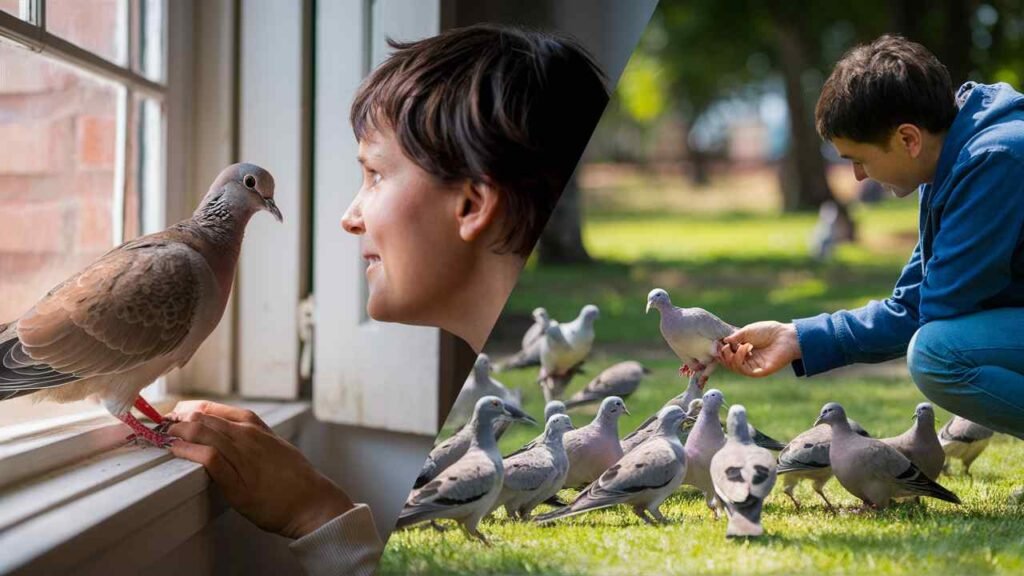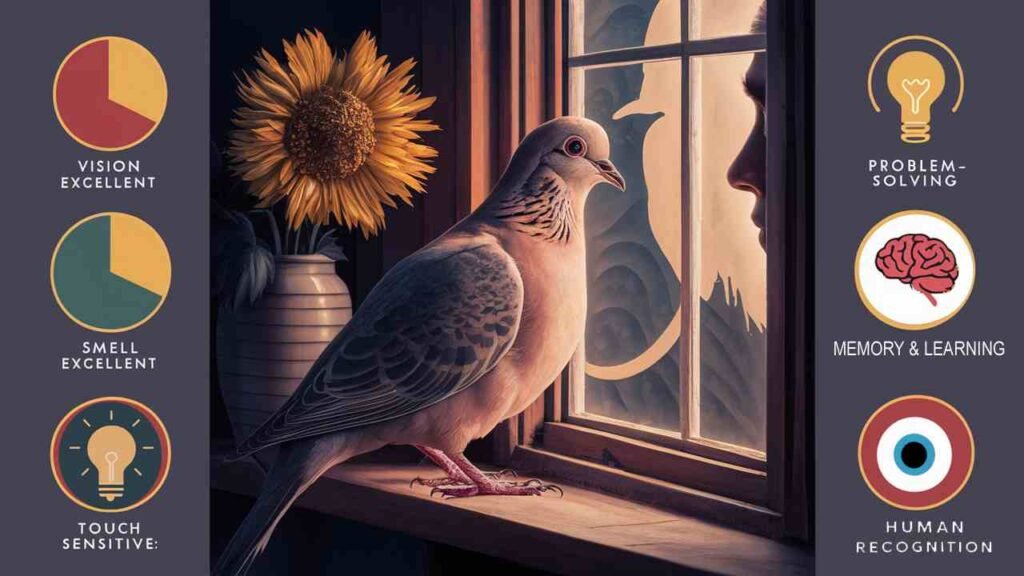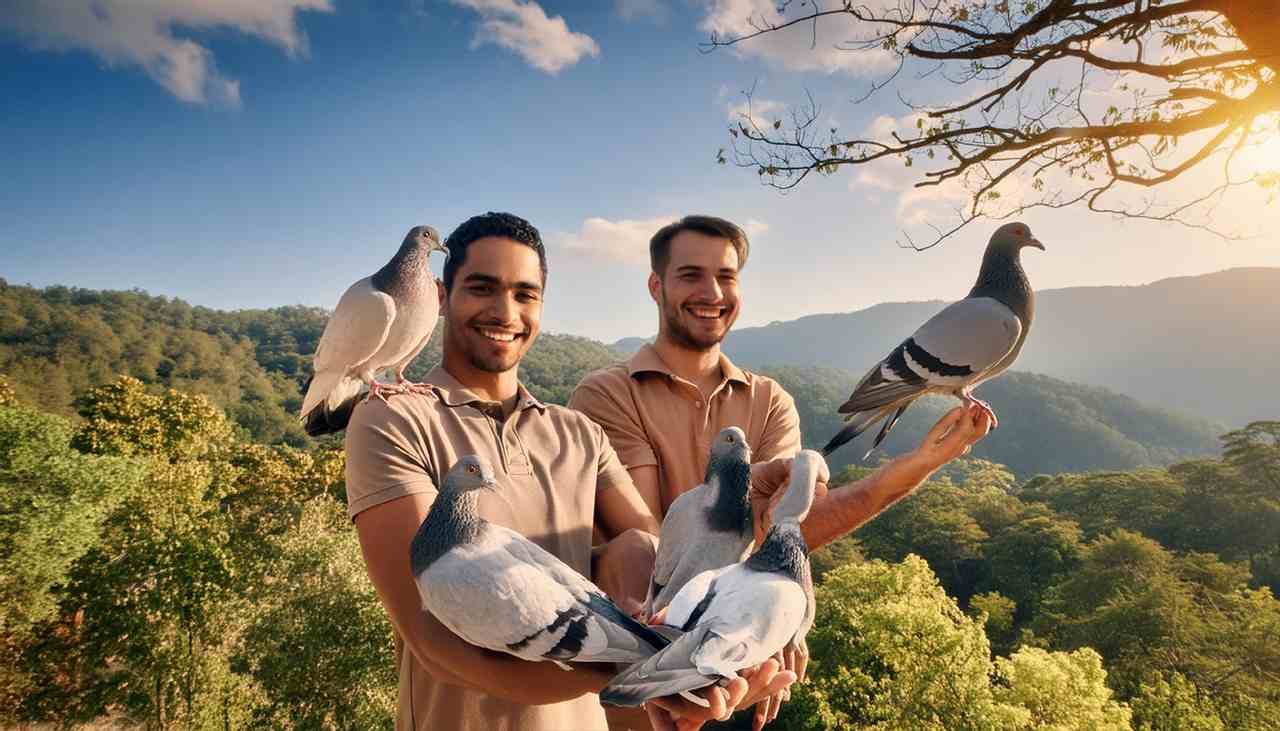Ever seen a dove perched on a phone wire, humbly cooing? Maybe you’ve asked yourself if these calm birds know about us humans around them. The truth, as with many bird-related issues, is intriguing and intricate.
Let’s dive into the fascinating realm of dove smarts, checking out how they know humans and their brain power. We’re going to unfold the mystery behind their awesome senses, look into their group activities, and reveal how they see their surroundings.
So, Do Doves Recognize Humans? The Current Understanding
Collecting proof continues, but it seems doves might recognize humans to some extent. Here’s an easy-to-understand update on what we know so far:
- Doves possess the needed senses (sight, sound, awareness of space) to tell humans apart.
- They display social habits, like spotting unique traits and picking up habits, that suggest they see humans as separate beings.
- Their brain skills, such as figuring things out, remembering, and learning, lay the groundwork for understanding facts about humans.

But, let’s not forget – doves’ way of recognizing humans could be distinct from our own understanding. They may identify us through particular traits, behaviors, or simply connect us with food or danger.
Decoding the Dove’s Sensory World: A Foundation for Recognition
Don’t let the fragile look of doves fool you, they have a pretty impressive set of senses. They use these to move around precisely. Let’s dive into some of these senses. They might help us understand how humans recognize things:
- Vision: Doves have great eyes that see more than humans. They can spot ultraviolet light. This possibly lets them see tiny changes in how humans look.
- Hearing: Doves can hear really well, picking up lots of different sounds like human voices. They seem to tell the difference between dove species‘ calls. This might mean they can identify different humans too.
- Spatial Awareness: Doves show a smart understanding of space. They can remember places and find their way over long trips. This knack may help them remember where they’ve met people before.

Sensory Abilities of Doves Compared to Humans
Here’s a table outlining a comparison of some key sensory abilities between doves and humans:
| Sense | Doves | Humans |
|---|---|---|
| Vision | Wide field of view (almost 360°), excellent near vision, can see ultraviolet light | Narrower field of view (around 180°), good near and far vision, cannot see ultraviolet light |
| Hearing | Excellent auditory acuity, can detect a wider range of frequencies | Good hearing, but not as sensitive as doves |
| Smell | Poor sense of smell | Good sense of smell |
| Taste | Limited sense of taste, primarily detect sweet, sour, and salty flavors | Relatively good sense of taste, can detect five basic tastes (sweet, sour, salty, bitter, umami) |
| Touch | Sensitive feet with well-developed tactile receptors | Less sensitive touch perception compared to doves |
Doves use their strong senses to collect lots of data around them, helping them identify humans. It’s like living in a world full of vibrant details.
The Social Lives of Doves: Clues to Human Recognition
An Insight into Human Recognition. Doves are social animals. They find one mate, usually for life, and talk in unique ways. Let’s see how their social life can tell us about human recognition:
- Individual Recognition: Closely related bird types like pigeons show signs of spotting distinct humans. This is more evident with people linked to food or danger. Considering their alike community bonds, doves could likely have this skill too.
- Adaptive Habits: Pigeons are quite the intellectuals. Their behavior can adjust based on past experiences. For instance, city-dwelling pigeons might come to connect people with potential meals.
- Communication and Alarm Calls: Doves have many ways to communicate to each other. Their voices can let others know when something scary is near, like people. Doves seem smart enough to know that people can be dangerous.
Potential Indicators of Human Recognition in Doves
This table summarizes some behavioral signs that might suggest human recognition in doves:
| Behavior | Possible Explanation |
|---|---|
| Increased alertness or alarm calls near unfamiliar humans | Doves might perceive unfamiliar humans as potential threats. |
| Tamer behavior towards humans who provide food | Doves can learn to associate humans with positive experiences like feeding. |
| Variation in cooing calls directed at different humans | Doves might have unique vocalizations for humans they recognize. |
| Remembering feeding locations frequented by specific humans | Doves’ strong memory could allow them to associate humans with reliable food sources. |
Though the proof isn’t definitive yet, we see signs in how doves interact socially. This suggests they might have the ability to remember and respond to different people due to their past encounters.
Unveiling the Dove Mind: Exploring Cognitive Abilities
Knowing how doves think and understand helps us decode the mystery of human recognition. Let’s take a peek into the intriguing thoughts of a dove:
- Problem-Solving: We’ve seen pigeons using implements like small branches to access food. Such capabilities hint at an advanced level of thinking that might be connected to identifying people and their various actions.
- Memory: Doves exhibit remarkable memory skills. They don’t forget where they find food, the way they’ve traveled, or even the birds they’ve met before. Their sharp memory could even help them recognize humans they’ve met in the past.
- Learning: Doves are quick to learn, adjusting what they do according to merits and setbacks. Their skill in learning might influence the way they see and react to different people.
Doves, known for skills like problem-solving and memory, show a smartness level. It might help them to identify us humans.
The Future of Dove Cognition Research: Unlocking More Secrets
The study of dove smarts is quickly growing. Take a peek at what’s coming:
- In-depth Behavior Experiments: Researchers studying doves in set environments can learn lots about how they identify and interact with different people.
- Neurological Investigations: Understanding the neural structures associated with memory, learning, and object recognition in doves could shed light on their human recognition capabilities.
- Comparative Studies: By checking out doves’ thinking abilities against other birds‘, we can learn tons about how recognizing humans may have developed in birds.
Researching these interesting topics could reveal more intriguing facts about dove intellect. It might even show us that these birds can identify the humans they meet.
Beyond Recognition: The Significance of Human-Dove Interactions
Understanding how doves see humans isn’t just for science. It matters because:
- Urban Dove Management: Doves often live in city settings. By studying how people behave, we can create better, harmless ways to manage these birds.
- Conservation Efforts: Doves face a lot of challenges, like losing their habitats. By figuring out how smart they are, we can plan how to protect them properly, taking care to make sure they’re okay.
- Our Bond with Birds: Knowing more about doves, like how smart they are and if they can recognize us, can help us appreciate our bird friends more, realizing why we need to live side-by-side peacefully.
Conclusion: Doves – More Than Just Feathered Friends
While conclusive evidence is still being gathered, many studies point to the idea that doves might be able to recognize people. These birds have outstanding senses and show social manners that imply they can identify individuals. Plus, their smart minds add to this possibility. Could doves know us by how we look, by our past dealing with them, or because they link us with food or danger? More investigations may unveil more surprising facts about this interesting bond between humans and doves.

